Are you running a real estate business? You should know about rental app development.
Real estate industry has been experience amazing growth in its tech sector. Consequently, giving us apps like zellow, IDX websites and many more.
One of the most popular solutions in real estate tech industry is, real estate rental app development. If you are new to the entire thing, this blog is for you.
Here, we shall be discussing all you need to know about the same. Therefore, with this being said, let’s get right into it:
Understanding the Rental Industry Landscape
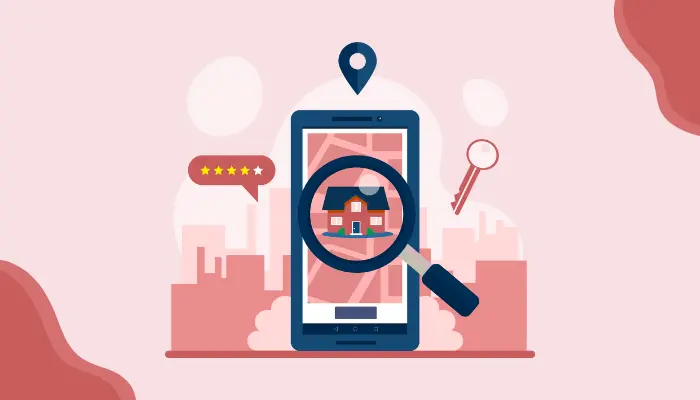
Understanding the Rental Industry Landscape
Before delving into the world of real estate rental app development, it’s crucial to grasp the diverse landscape of the real estate rental industry.
The market encompasses a wide range of property types, from apartments and houses to commercial spaces and vacation rentals.
Each sector has its unique challenges, including property listing management, tenant screening, lease agreement handling, and maintenance coordination.
Moreover, recognizing these challenges sets the stage for how a real estate rental app can provide solutions.
For instance, property managers often struggle with efficiently showcasing properties to potential tenants, handling lease agreements and rent payments, and maintaining clear communication throughout the tenant lifecycle.
Similarly, tenants may face difficulties in finding suitable properties, understanding lease terms, and managing maintenance requests.
Real Estate Rental App Development
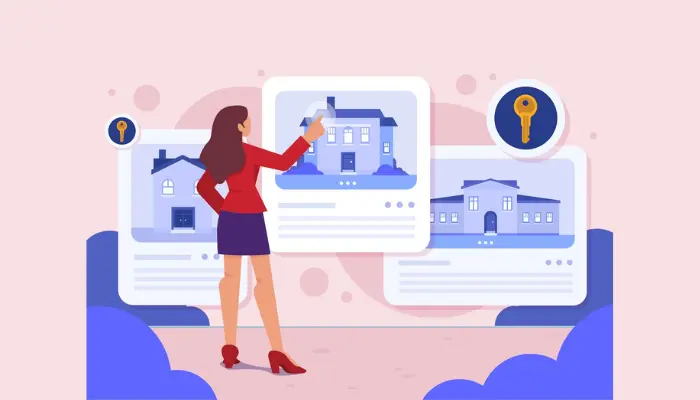
Real estate rentals apps are one of the most popular type of real estate app development. Let’s discuss this in detail.
Real estate rental app development involves creating a digital platform that connects property owners, property managers, and tenants in a seamless manner.
By digitizing the process, you can offer a more convenient and efficient experience to all parties involved. Whether you’re starting from scratch or looking to enhance your existing app, the development process consists of several key stages.
Moreover, the initial stage involves conceptualization and planning, where you define the app’s goals, features, and target audience within the context of the real estate rental industry.
But we shall be discussing the entire development process in detail later down the line. Meanwhile, let’s look a benefits rental app development in the section below.
Benefit of Rental App Development For Real Estate Businesses
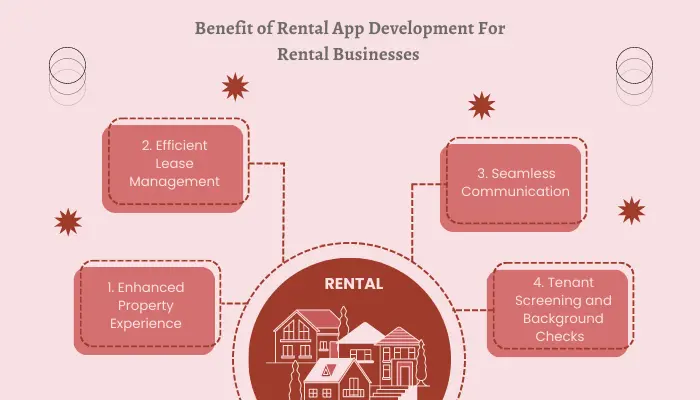
Benefit of Rental App Development For Rental Businesses
Majority of the investors who are considering “rental app development” look for reasons to do so. And rightfully so!
Well, in this section of the blog, we shall be discussing just that. These are, as mentioned below:
Enhanced Property Experience
Real estate rental apps significantly enhance the property discovery experience for potential tenants.
Users can easily browse available properties, view high-quality images, access detailed descriptions, and even take virtual tours of the properties.
Moreover, location-based searches and advanced filters allow users to find properties that match their preferences and requirements.
Efficient Lease Management
One of the biggest challenges in real estate rentals is managing lease agreements and rental payments.
And this is something a real estate rental app can solve.
This mobile app automates lease agreement generation, electronic signatures, and rent collection.
In addition, the platform also provides reminders for upcoming payments and lease renewals, reducing the risk of missed deadlines.
Seamless Communication
Clear communication between property managers and tenants is crucial for a smooth rental experience.
Real estate rental apps offer in-app messaging features that facilitate direct communication between parties.
Maintenance requests, inquiries, and updates can be exchanged conveniently within the app.
Tenant Screening and Background Checks
Real estate rental apps can integrate tenant screening and background check services, making it easier for property managers to evaluate potential tenants.
This enhances the quality of tenants and minimizes the risk of problematic renters.
With this out of the way, it’s time to look at the key feature that every real estate rental app should have.
Key Features of a Rental App Development
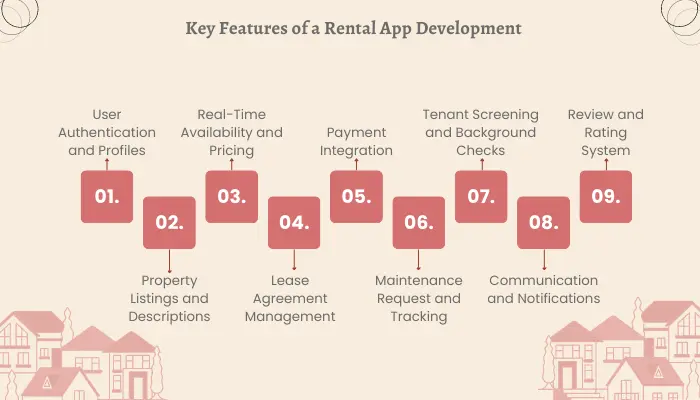
Key Features of a Rental App Development
Whether you want to create an app like Offerup, or something else, features are one of the most important aspect of rental app development.
To help you with the same, we shall be going through key features for your real estate rental app.
User Authentication and Profiles
A user-friendly registration and login process is essential. Property owners, property managers, and tenants should have separate access, each with their respective dashboards.
Property Listings and Descriptions
High-quality images, virtual tours, and detailed property descriptions are crucial for users to make informed decisions. Include specifications, amenities, and any other relevant information.
Real-Time Availability and Pricing
Integrate a real-time availability calendar that users can check before expressing interest in a property. Pricing information should be transparent and accurate.
Lease Agreement Management
The app should facilitate the creation, signing, and storage of digital lease agreements. Allow for customization based on property type and local regulations.
Payment Integration
Secure payment gateways enable seamless rent payments. Provide multiple payment options, including bank transfers and digital wallets.
Maintenance Request and Tracking
Implement a system for tenants to submit maintenance requests and track their status. Property managers can assign tasks and update tenants on progress.
Tenant Screening and Background Checks
Integrate third-party services for tenant screening and background checks. This feature helps property managers make informed decisions about potential tenants.
Communication and Notifications
In-app messaging enhances communication between property owners, property managers, and tenants. Automated rent payment reminders and lease renewal notifications keep everyone informed.
Review and Rating System
Implement a review system that allows tenants to provide feedback about their rental experience. Property managers and property owners can also review tenants.
AirBnB Case Studies Successful Rental App Implementations
Airbnb’s real estate rental app revolutionized the hospitality and vacation rental sector.
By automating property rentals, the app streamlined the process of listing, booking, and payment for both hosts and guests.
The app’s success can be attributed to its user-friendly interface and innovative approach.
Airbnb’s journey from a startup to a global leader showcases the potential of real estate rental app development.
Moreover, the platform eliminated intermediaries by connecting hosts directly with guests. Through the app, property owners could easily list their spaces, set pricing, and communicate with potential renters. Guests benefited from a convenient booking process and access to a wide range of unique accommodations.
Now that we are done with this, it’s time to develop a rental app, which we will do in the section below:
Steps to Develop a Rental App
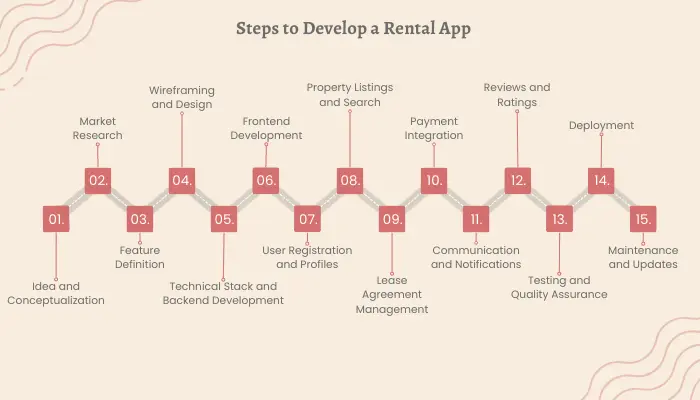
Steps to Develop a Rental App
It’s time to develop a rental app.
So, what’s the rental app development process for a real estate business? well, it is simple enough. And we shall be going through each step.
Let’s get right into it:
1. Idea and Conceptualization
Define the purpose of your real estate rental app. Identify the types of properties you want to facilitate rentals for and the key pain points you aim to address.
2. Market Research
Research your target audience, including property owners, property managers, and tenants. Understand their preferences, challenges, and expectations from a rental app.
3. Feature Definition
Outline the key features your real estate rental app will have.
This might include user registration, property listings, search and filtering options, lease agreement management, payment processing, and communication tools.
4. Wireframing and Design
Create wireframes or sketches that lay out the app’s interface and navigation flow.
Design the user interface (UI) to be intuitive, user-friendly, and consistent with your branding.
5. Technical Stack and Backend Development
Choose the appropriate technology stack for your app.
Develop the backend to handle user data, property information, lease agreements, payments, and communication. Set up databases, servers, and APIs.
6. Frontend Development
Build the frontend of your app based on the wireframes and design. Develop the user interfaces for different screens, ensuring a responsive experience across devices.
7. User Registration and Profiles
Implement a user registration and authentication system. Allow property owners, property managers, and tenants to create profiles, log in securely, and manage their information.
8. Property Listings and Search
Create a platform for property owners and managers to list their properties for rent. Develop a robust search and filtering mechanism to help users find suitable properties.
9. Lease Agreement Management
Enable property managers and tenants to create and sign digital lease agreements. Implement a secure storage system for important documents.
10. Payment Integration
Integrate secure payment gateways to handle rent payments. Allow for recurring payments and multiple payment methods.
11. Communication and Notifications
Implement in-app messaging for seamless communication between property owners, property managers, and tenants. Send automated notifications for rent due dates, lease renewals, and maintenance updates.
12. Reviews and Ratings
Incorporate a system for tenants to leave reviews and ratings for the properties they’ve rented. This builds trust and transparency within the community.
13. Testing and Quality Assurance
Thoroughly test your app for functionality, usability, and security. Conduct user testing to ensure that the app meets the needs of property owners, property managers, and tenants.
14. Deployment
Once testing is complete, deploy your real estate rental app to app stores (e.g., Apple App Store, Google Play Store) following the platform guidelines.
15. Maintenance and Updates
Continuously monitor the app’s performance and gather user feedback. Regularly update the app to fix bugs, improve features, and adapt to changing user needs.
Now that we are done with rental app development, it’s time to learn about cost to create rental app.
Real Estate Rental App Development Cost
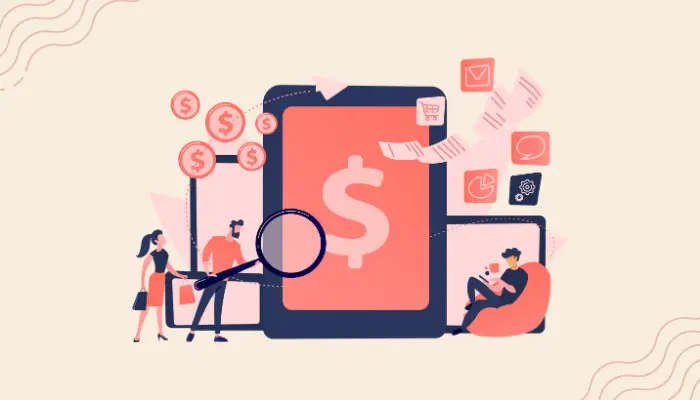
For real estate rental app development, you would need to consider various factors that can influence the cost. These factors include:
- the complexity of the app
- the features you want to include
- the platform(s) you plan to target (iOS, Android, web)
- the design and user interface
- backend development
- integration with databases and APIs
- testing
- and ongoing maintenance.
Custom app development costs can vary significantly, but as a rough estimate, a basic real estate rental app might cost anywhere from $30,000 to $50,000.
However, if you’re aiming for a more feature-rich app with advanced functionalities such as property search filters, user profiles, messaging, payment processing, reviews, and maps, the cost could range from $50,000 to $100,000 or more.
Keep in mind that these figures are approximate and can vary based on your specific requirements, the development team’s rates, location, and other variables.
It’s recommended to consult with app development companies or freelancers to get accurate cost estimates tailored to your project’s needs.
Future Trends in Rental App Development
If you want to create the next best rental app, you have to make it future ready. Therefore, let’s go through some of the top future trends in the industry.
1. Virtual and Augmented Reality (VR/AR)
VR and AR technologies can provide virtual property tours, allowing users to explore properties remotely. AR can superimpose virtual furniture and decorations into real-world property images, helping tenants visualize the space.
2. Blockchain for Security and Transparency
Property management using Blockchain technology can enhance security in property transactions and lease agreements. Smart contracts can automate rent collection and ensure transparent, tamper-proof records.
3. AI-Powered Property Matching
AI algorithms can analyze user preferences and property attributes to suggest personalized property recommendations. This enhances the property discovery process and increases user satisfaction.
4. IoT Integration for Smart Properties
IoT devices can transform properties into smart homes with remote control and monitoring capabilities. Tenants can control lights, thermostats, and security systems through the app.
5. Predictive Analytics for Rent Trends
Predictive analytics can help property managers and owners forecast rent trends and market demand. This data-driven approach aids in setting competitive rental prices.
Conclusion
In the evolving landscape of real estate rentals, adopting a rental app can be a game-changer for property owners, property managers, and tenants. By addressing pain points and incorporating innovative features, you can enhance the rental experience, improve efficiency, and build lasting relationships within the real estate community. Just as Airbnb disrupted the hospitality sector, a well-designed real estate rental app has the potential to reshape the way properties are rented and managed.
FAQ
A rental app streamlines property listing, tenant communication, and rent collection. It enhances efficiency and makes property management more convenient.
Yes, modern apps use encryption and secure payment gateways to protect user data and financial transactions, ensuring a safe rental experience.
Absolutely, apps offer advanced search filters and property details to help tenants find properties that match their preferences and requirements.
Yes, apps automate lease agreement creation, electronic signatures, and rent payment reminders, making lease management efficient for both parties.
In-app messaging facilitates quick and direct communication between property managers and tenants for rent-related matters and maintenance requests.
Yes, apps can integrate third-party tenant screening services, allowing property managers to make informed decisions about potential tenants.
User reviews build trust and credibility. Positive reviews attract more tenants, while negative feedback offers insights for improvement and transparency.
Yes, app updates are possible. Regularly adding features based on user feedback keeps your app relevant and enhances the user experience.
Development timelines vary based on complexity. A typical rental app might take a few months to design, develop, test, and launch successfully.
Yes, apps have user-specific dashboards for property owners, property managers, and tenants, ensuring a tailored and user-friendly experience for all.
Monitor metrics like user engagement, downloads, booking frequency, and user feedback to gauge the app’s impact and success.

Niketan Sharma is the CTO of Nimble AppGenie, a prominent website and mobile app development company in the USA that is delivering excellence with a commitment to boosting business growth & maximizing customer satisfaction. He is a highly motivated individual who helps SMEs and startups grow in this dynamic market with the latest technology and innovation.
Table of Contents




No Comments
Comments are closed.